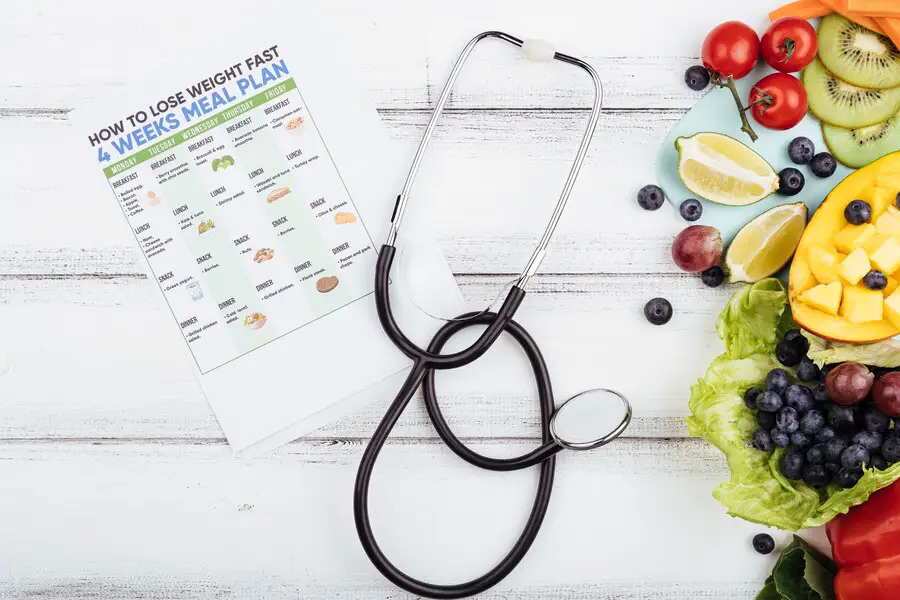9 Nutrition Tips to Control Heart Disease: A Patient’s Guide!
While heart disease is a life-threatening health problem worldwide, there are also ways to tackle the issue through nutrition effectively, and in this extensive article, we will search for these ways to tackle the problem. In this article, I’ll provide practical advice & helpful information to help you care for your heart, whether you were recently diagnosed with heart disease or are looking for ways to avoid it. If you are looking for ways to aid your heart health and overall wellness, this blog post would be informative – all it requires are a few seconds with your scrolling. Let’s get started!

Introduction to Heart Disease and its Connection to Nutrition
Cardiovascular disease takes first place as the global cause of death. It encompasses a variety of disorders like coronary artery disease, heart attack, and stroke. People are sadly afflicted by it because of hereditary reasons, a sedentary lifestyle, smoking, and several other factors. However, nutrition has its place in developing and controlling the disease.
There is a definite relationship between nutrition and heart health. Our diet affects cholesterol, blood pressure, and weight; cardiovascular health follows suit. Excessive consumption of sugar, salt, fats, and processed foods compounds the risk for heart ailments. On the other hand, a balanced diet of whole grains, fresh vegetables and fruits, and proteins can ward off heart ailments.
- It can be noted that by the type of cardiovascular disease, one has, one’s nutrition may differ. For instance:
- People with high cholesterol levels may have to decrease their consumption of high saturated fats found in red meat and full-fat dairy products.
- Patients suffering from increased blood pressure should minimize the gel in the form of sodium from processed foods such as canned soups and snacks.
- People with diabetes are required to restrict the amount of carbohydrates they ingest to maintain their blood sugar levels at the desired level.
- They are also required to eat more protein-containing food for tissue healing and recovery after a heart attack or surgery.
Higher body weight or obesity is also defined as an increase in body mass index (BMI). Cardiovascular diseases, which are more common and highly dangerous to humans, are high Cholesterol levels and high blood pressure. Therefore, adopting a proper nutrition plan would be beneficial in stopping or controlling these diseases. Proper nutrition aids in controlling heart disease in humans.
In this guide, we aim to discuss nutrition strategies for different cases involving patients suffering from cardiomyopathy, a chronic cardiovascular disorder. These strategies help concentrate on the diet goals instead of single nutrients or superfoods. This would either reduce the intensity of or eliminate heart issues if followed along with different medications and treatments.
Together with you, we ensure that medical nutrition therapy can significantly improve, if not eliminate, medical conditions. In heart attacks or diseases, what a patient eats is not as relevant to the type of medications or injections given to the patient. Therefore, nutrition needs to be understood in a greater context, with a comprehensive plan to follow.
Understanding the Role of Diet in Managing Heart Disease
Heart disease can be managed in part by what we eat. The connection between our diet and the health of our hearts needs to be properly understood.
Some foods can directly affect risk factors such as hypertension, cholesterol, and inflammation, which are significant in the development and progression of heart disease. Eating well can help us control the risk factors of further heart damage.
What foods are recommended for a heart-healthy diet? To begin with, foods that contain high saturated fat, trans fat, & cholesterol should be limited or completely avoided, such as red meat, processed meat, fried items, dairy with high fat, and baked products that contain hydrogenated oil.
Rather, meals should consist of a higher portion of fruits and vegetables, as they provide a higher quantity of antioxidants, which in turn help control inflammation within the body. They are low in calories but high in fiber, which impacts weight loss, an important aspect of heart disease control.
Whole grains such as brown rice, quinoa, whole wheat bread, pasta, and cereals are good for heart health and should, therefore, be included in any healthy diet as they are a great source of both fiber and B vitamins.
Heart patients must integrate lean protein sources such as, but not limited to, fish, skins removed poultry, beans, lentils, nuts, seeds, and low-fat dairy products like yogurt and cottage cheese. An example of a fish would be salmon.
The human heart can become severely damaged if sodium levels are not kept in check, as high sodium can increase blood pressure. It is advised that a person consume 2-3 grams of sodium in a day, which is roughly equal to a single teaspoon. Next time you purchase canned or packaged foods, utilize the nutrition label so that you can make better choices regarding sodium levels.
The role of nutrition in heart disease management is critical, as it provides insights for additional improvement. A healthier lifestyle that lowers heart disease risk involves consuming more fruits, vegetables, whole grains, and lean proteins while reducing unhealthy fats, sodium, and added sugars.

Key Nutrients for a Heart-Healthy Diet
Heart diseases can be controlled by incorporating some key nutrients into the daily diet and a heart-healthy meal plan can help to achieve that goal. Nutrition is key when it comes to heart health; here is the nutrition your heart desires:
- Omega-3 Fats: Omega-3 fatty acids are predominantly found in cold-water fish like mackerel, salmon, and tuna and are also provided by walnuts, flaxseeds, and chia seeds. It is well known that this kind of fat possesses anti-inflammatory abilities, such as abrasion or interference due to injury or irritation, which helps reduce the chances of heart disease.
- Antioxidants: Antioxidants are essential in the body as they fight free radicals, which tend to damage healthy cells. Tomatoes, berries, peppers, spinach, and kale are great sources of antioxidants.
- Potassium: Sensing potassium helps the body balance sodium, which ultimately helps maintain steady blood pressure. Spinach, intact potatoes, Swiss chard, avocados, and bananas are all great sources of potassium.
- Fiber: A high-fiber diet is associated with lower LDL levels and bad cholesterol and a reduced risk of heart failure. Healthier foods focus on whole grains, beans, legumes, vegetables, and fruits.
- Magnesium: Magnesium and potassium regulate blood pressure and heartbeat. A magnesium-rich diet includes whole grain products, nuts & seeds, and dark green vegetables.
- Vitamin D: Vitamin D is also essential to the heart due to its cardioprotective effects. Vitamin-D deficiency has been linked with the development of cardiovascular diseases, which are among the most common diseases today. It is recommended that you get 15 minutes of su. Daily, or within Australia, eggs, milk, and fatty fish are some,e foods fortified with Vitamin D
- Sodium: According to dietary guidelines, healthy adults should consume not more than 2300 mg of sodium daily. Consuming more than that intake has been associated with an increased risk of hypertension, which puts people at risk of cardiovascular diseases. Sodium has become a common ingredient in processed and packaged foods and fast-food restaurants; therefore, it’s essential to read the labels and choose lower-sodium-content products when available.
A diet complemented with the nutrients above improves heart health. It is also equally important to minimize the intake of processed foods, deep-fried foods, and fatty meats, as these are high in harmful trans & saturated fats, which raise cholesterol levels and heart disease risk.
There is a recommendation to seek assistance from healthcare professionals or dietitians to develop nutrition plans tailored to specific diet requirements. Integrating these nutrients into your daily regimen could lower your risk of developing heart disease & sustaining a healthy heart.
Foods to Incorporate into Your Diet for Heart Health
In modern society, heart disease is one of the leading causes of mortality; however, it is manageable and preventable. To prevent it, there are key elements one must consider, one of which includes having a balanced and healthy diet. This part of the paper will examine key imperative foods to add to the diet for optimal heart health.
- Fatty Fish: Essential fatty acids can be found in mackerel, salmon, and tuna, all classified as fatty fish. It has been scientifically proven that these essential fats can help decrease one’s risk of acquiring heart disease, primarily through reducing inflammation, blood pressure, and triglyceride levels. At a bare minimum, aim to have one serving of fatty fish in your meals at least twice a week.
- Leafy Greens: Spinach, collard greens, and kale contain massive amounts of nutrients to facilitate heart health. They contain vitamins, antioxidants, minerals, and fiber, all vital for a healthy heart. Furthermore, leafy greens have nitrates that can promote better blood circulation and help lower blood pressure.
- Berries: Strawberries, blueberries, raspberries, and blackberries are incredibly tasty and also provide a myriad of heart health benefits. Berries contain high doses of antioxidants, which can aid in cell protection and help mitigate cardiovascular diseases.
- Dark Chocolate: Dark chocolate can benefit heart health but should be consumed in moderation—about 1-2 squares per day. Its flavonoids are antioxidants that protect against heart disease by countering free radical damage.
- Whole grains: Whole grains like oats, quinoa, and brown rice are vital for a healthy heart. They provide numerous health benefits, including fiber that helps regulate blood sugar and lower cholesterol.
- Nuts: Almonds and walnuts are dietary staples for many cultures. These nuts provide unique nutritional benefits, including magnesium, potassium, and vitamin E, linked to better heart health. These nuts also contain polyunsaturated fats that, if followed in moderation as part of a healthy routine, reduce LDL (harmful) cholesterol levels.
Similar to the previous nuts in promoting heart health, tomatoes are also known to have a similar effect. Tomatoes are enriched with lycopene, which has been noted to lower the risks of heart disease, alongside potassium, vitamin C, and fiber.
Incorporating these foods into your regimen will benefit your heart health.However, you should remember that no one food will single-handedly treat or prevent heart disease. The goal is to maintain a well-balanced diet that comprises vegetables, fruits, whole grains, and lean meats, alongside the avoidance of dead fats, added oils, and sugars.
Before altering your eating habits dramatically, be sure to contact your doctor. They can give recommendations tailored to you and your medical background.ry. By incorporating these nutrient-dense foods into your meals regularly, along with other lifestyle changes such as regular exercise and stress management techniques, you can take control of your heart health and reduce the risk of heart disease.

Sample Meal Plan for a Heart Patient
Amid a heart disease diagnosis, restricting certain foods can enhance the condition and lessen the risk of future incidents. In the case of a heart concern, your meal plan should include foods rich in nutrients, fiber, vitamins, and minerals but be low in saturated fats, sodium, and cholesterol.
Here is a sample meal plan for a heart patient that provides balanced nutrition while promoting heart health:
Breakfast:
- One boiled or poached egg
- Whole-grain toast with avocado spread
- One small orange
- 1 cup of green tea
Why it works: This breakfast option includes lean protein from the egg, healthy fats from the avocado spread, complex carbohydrates from whole-grain toast, and vitamin C from the orange. Green tea has antioxidants that may reduce blood pressure.
Mid-Morning Snack:
- handful of raw almonds
- Small apple
Raw almonds contain healthy fats that support good cholesterol. The apple adds natural sweetness and fiber, keeping you feeling full until lunchtime.
Lunch:
- Grilled chicken breast (3 ounces)
- Quinoa salad mixed up with bell peppers, cucumbers, and red onions.
- Side salad with olive oil-based dressing
Why it works: Grilled chicken’s lean protein, high-fiber quinoa, and vegetables make this lunch option both filling and nutritious. An olive oil-based dressing adds healthy fats without increasing saturated fat intake.
Afternoon Snack:
- Carrot sticks with hummus dip
Why it works: Hummus is made from chickpeas, a potent plant-based protein and dietary fiber source. Carrots provide beta-carotene, which has been linked to improved cardiovascular health.
Dinner:
- Grilled salmon (4 ounces)
- Brown rice pilaf with mixed vegetables (onion, zucchini, broccoli)
- Steamed asparagus
Why it works: Salmon is rich in omega-3 fatty acids, which have been shown to lower the risk of heart disease. Brown rice and steamed vegetables provide complex carbohydrates and fiber while staying low in sodium.
Dessert:
- One small bowl of fresh berries (strawberries, blueberries, raspberries)
Why it works: Berries are packed with antioxidants that can help reduce inflammation and protect against heart disease.
Stay hydrated by drinking water and cutting down on sugary drinks. Following a heart-healthy meal plan like this can improve your heart health and promote overall well-being. Consult a registered dietitian for personalized recommendations, & incorporate regular physical activity into your lifestyle for optimal results.
Tips for Dining Out and Making Healthy Choices
Going out for a meal could be exciting and enjoyable. However, it may be an arduous task to maintain a heart-healthy diet, especially for a heart patient, given the large serving sizes of the meals. It is easy to deviate from what is considered a heart-friendly meal when there are a large number of meals present on the menu. However, here are some tips that can help you eat a meal that is friendly for your heart while eating out.
- Make plans: Research the restaurant beforehand to understand the heart-friendly meals on the menu clearly. This enables you to make healthy decisions rather than being influenced by your companion’s orders.
- Serving size: To avoid consuming more than necessary, ask a friend to split an entree or request a takeout container. Having a beverage like water beforehand can also help.
- Selection of meals: While ordering grilled or baked dishes, fried items can be avoided. As high oil content and fats are added, frying can be deemed an unhealthy cooking option. Baked and grilled dishes can benefit someone suffering from heart disease.
- Load up on vegetables: Fresh vegetables are always good to have in any of your meals as they are an excellent supplement of nutrients and fibers known to be good for heart health. Try to search for meals that use vegetables as the primary component or ask for them to be served on the side.
- Don’t give “dressing” everything as the sauces on meals: This is hard to avoid for food lovers. Many sauces and dressings served in restaurants are rich in sodium, sugar, and unhealthy fats, and frequent consumption can harm heart health. Since you are paying for the food, reduce the amount of sauce and dressings added frequently and ask for them to be served on the side.
- Reduce the amount of alcohol consumption: Remember that alcohol is a high-calorie beverage, and excessive consumption is also a risk factor for cardiometabolic diseases. While I understand some of you like to drink alcohol when going out for food, try limiting to just one drink and go for options like wine or light beer.
- Do not hesitate to ask for a special meal: If you want to examine the menus more closely, do not be afraid to ask your waiter if there are healthier options for a particular meal or if some ingredients can be replaced. Most restaurants are happy to serve you according to your choices, so use that to say which food you want.
Remember that making minor changes to what and how you eat can go a long way in ensuring proper care of heart disease. Consider the suggestions mentioned above so you can keep going out for meals without compromising your cardiovascular well-being.ease in the long run.
The Importance of Exercise in Managing Heart Disease
Controlling heart issues is an ongoing endeavor that entails several critical elements, including diet and exercise. In this section, we will examine the role of physical activity in controlling heart disease’s progress and how it changes the overall care outcome.
Patients with heart issues who exercise regularly have been shown to have many positive health outcomes. The heart becomes a more effective pump as a result of well-muscular exercising. This lowers the heart’s workload while lowering high blood pressure, another key cause of heart disease.
Also, there is an increase in the supply of oxygen to peripheral muscles, increasing the overall fitness of the cardiovascular system. It follows that people with heart deficiencies will be able to perform activities of daily living with reduced effort and decreased levels of tiredness. Exercise also improves cholesterol levels and reduces inflammation in arteries, preventing cholesterol plaque formation.
Weight management is another important aspect of treating heart problems, where physical activity is crucial. Heavy weight and obesity are implicated in an increased possibility of high blood pressure, diabetes, and other conditions that overwork the heart. Exercise aids in weight management because it reduces the amount of latent energy in the body by burning calories and enhances the rate of metabolism.
In addition, people suffering from heart disease can handle pressure better with regular physical exercise. Stress can trigger elevated blood pressure and encourage unhealthy habits, such as smoking or overeating. At the same time, a brisk walk can relieve stress as long as it triggers the endorphins, sometimes referred to as hormones associated with happiness.
Exercise can also provide an excellent improvement in mental health for heart patients since lack of exercise can lead to symptoms of depression and anxiety provoked by the situation they find themselves in as heart patients. However, several studies have revealed that being active can improve emotional rigidity and lower the levels of depression and anxiety.
Chronic patients like heart patients might be uncomfortable considering a new workout plan. Consulting with doctors before embarking on a new strategy is an important step. Working with a physician ensures that one does exercises adapted to one’s condition, and as they monitor the participants, proper safety measures are ensured.
Exercise is one of the regular activities you should incorporate into your routine to control your heart disease. It has multiple advantages, including—but not limited to—strengthening the heart, enhancing cardiovascular function, assisting with weight control, and reducing stress, consequently improving mental health. There is conclusive evidence indicating that exercise and nutrition when done consistently, can help a person manage heart disease and enhance well-being.
Navigating Common Challenges with Nutrition and Heart Disease
Dealing with potentially life-threatening conditions such as heart disease can be difficult, but knowing how to manage your heart can make the process of dieting and adjusting relatively easy. In the upcoming paragraphs, we will highlight relevant challenges patients suffering from heart disease face on a diet.
- Dietary Restrictions: Fatigue and alcohol restrictions can be a massive challenge for someone with heart disease as they can be socially limiting. Regular consumers of specific foods find it challenging to diet without them; thus, catering to the dietary restrictions can be a strong challenge to overcome.
- Lack of Knowledge: Understanding patients are overwhelmed with the confusion online about what foods specifically aid their heart health and what foods would prove harmful. This, in turn, makes it difficult for them to distinguish what a ‘heart-healthy diet’ constitutes.
- Time Constraints: Creating a schedule that includes buying groceries, meal prepping, and cooking time can be tedious, especially for someone not used to doing them. Being short on time can be a more significant hindrance to the goal of managing heart disease.
- Social pressure: People always regard eating as an activity that requires people to go out with friends and family; this pressure people can influence individuals to follow the set dietary plan they have for themselves. Socializing alongside family and friends makes it hard to gather the willpower and will not adhere to one’s healthy eating plans.
- Emotional Eating: A significant population uses food to comfort itself during distress times such as stress. This eating behavior, coupled with an established heart condition, can lead to overeating or developing a stronger preference for unhealthy food.
These individuals are often curious about how to deal with the everyday hurdles stated above. Below are some solutions that might be helpful:
- Speak with Your Healthcare Team: Talk to your healthcare provider or dietitian about dietary plans. They can help create balanced meals to meet your nutritional needs.
- Educate Yourself: It is crucial to gain sufficient information about healthy dietary options for your heart and which ones should be limited or avoided entirely. Always obtain such information from credible sources, such as government health websites or books written by professionals.
- Meal Prep: Meal planning saves time during the week. Consider cooking food in bulk over the weekend or cutting the ingredients in advance.
- Talk To Others: Tell your relatives or buddies about your food intake restrictions so they do not jeopardize your social life when you attend such events together. And when you are out with friends, you can recommend that they order something that would be better for both of you.
- Look For Other Ways To Counter: You can treat and look for other ways to manage stress and emotional distress that are not tied to food by going to the gym, meditating, or even discussing it with the therapist you see.art disease through nutrition may seem challenging at first, but with the right.
Conclusion: Empowering Yourself with Nutrition for Better Heart Health
Nutrition plays a crucial role in heart disease and heart management. This guide’s techniques will assist you in altering your diet and taking the steps needed to improve your heart’s health.
It is essential to know how nutrition affects heart disease. You are prone to heart disease if your diet contains high levels of saturated and trans fat, in addition to high cholesterol. However, including vegetables, fruits, whole grains, healthy fats, and lean proteins in your diet will ultimately reduce your chances of acquiring it.
Another nutrition or dietary aspect that helps manage heart disease is monitoring the portion of nutrients consumed. The heart’s stamina is tested when large quantities of food are consumed in one sitting. To avoid excessive amounts of food, measure cups or scales to monitor the size of your portions.
Additionally, looking out for low sodium and added sugar labels is key to selecting heart-friendly products when grocery shopping. One should always consider portion sizes per serving. Increased amounts of plant-based meals in the diet should also be considered, as they are low in life-threatening fats.
Aside from the above aspects, proper hydration is good for overall bodily health, including the heart. As a rule of thumb, drinking about eight glasses (64 ounces) a day or even more is recommended if you are physically active or live in hot conditions.
If the patient takes charge of what they eat, a shift towards better nutrition will benefit heart health and overall well-being. Nutrition, however, is not a cure nor a preventive measure for heart disease because Medical interventions offered by specialized practitioners are necessary alongside proper nutrition to tackle the disease’s threat.
Use diet and nutrition as your most potent weapon against heart disease. Аs people say, “The small things I do every day count,” The same applies whether you want to lose weight or improve your heart’s health – you’ll have to build healthy habits like thinking twice before having any food into your mouth, taking the time to read labels, avoiding sugary drinks, and so on. Consulting healthcare professionals is crucial. Remember, every small change counts. Take control of your heart and body by mastering your diet!



